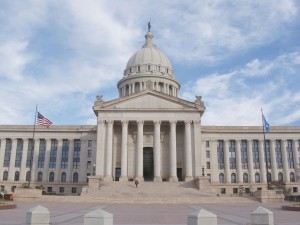 OKLAHOMA CITY — A district judge in Oklahoma has ruled that a Ten Commandments monument challenged by the American Civil Liberties Union (ACLU) and a liberal Baptist minister does not violate the United States Constitution and may remain in place on the grounds of the state capitol.
OKLAHOMA CITY — A district judge in Oklahoma has ruled that a Ten Commandments monument challenged by the American Civil Liberties Union (ACLU) and a liberal Baptist minister does not violate the United States Constitution and may remain in place on the grounds of the state capitol.
In granting a motion for summary judgment by the Oklahoma Capitol Preservation Commission, Judge Thomas Prince concluded that the monument served a historical purpose and not solely the presentment of a religious message as it sits on a plot of land that contains 51 other expressive monuments.
“Today’s ruling is a clear message that the Ten Commandments can be displayed on public grounds like the Oklahoma Capitol because of the historical role the text has played in the founding of our nation,” said Attorney General Scott Pruitt. “The U.S. Supreme Court found constitutional a nearly identical monument in Texas. We were confident in the state’s case from the start and appreciate the court’s thoughtful consideration and ruling in the state’s favor.”
As previously reported, the monument was proposed by Rep. Mike Ritze in 2009, and was soon after approved by the largely Republican-run state legislature. Ritze paid over $1000 for the display, and no taxpayer funds were utilized in its creation.
“[T]he Ten Commandments are an important component of the foundation of the laws and legal system of the United States of America and of the State of Oklahoma,” the bill authorizing the monument acknowledged. “[T]he courts of the United States of America and of various states frequently cite the Ten Commandments in published decisions, and acknowledgements of the role played by the Ten Commandments in our nation’s heritage are common throughout America.”
The six-foot display was erected three years later, but the ACLU asserted that the monument was unconstitutional.
“The monument’s placement at the Capitol has created a more divisive and hostile state for many Oklahomans,” stated Ryan Kiesel, the executive director of ACLU of Oklahoma, in a news release. “When the government literally puts one faith on a pedestal, it sends a strong message to Oklahomans of other faiths that they are less than equal.”
Last August, the organization filed suit against the monument, with the lead plaintiff being minister Bruce Prescott, the director of Mainstream Oklahoma Baptists. Prescott said that mixing the sacred with the secular in such a manner cheapens the display, and asserted that it violated the Constitution’s Establishment Clause, which says that “Congress shall make no law respecting an establishment of religion…”
A New York-based Satanist group then proposed to place an “homage to Satan” near the monument, and other groups soon presented their requests as well, but the Capitol Preservation Commission placed a moratorium on any proposals until the lawsuit was decided.
On Friday, Judge Prince ruled that the monument did not present any constitutional infringement and tossed the suit by means of summary judgment. Kiesel said that he is disappointed in the outcome.
“Not only is the exploitation of the Ten Commandments for political purposes an insult to the many Oklahomans who incorporate the commandments into their religious observance, it marginalizes those Oklahomans of different faiths and no faith at all by sending a distinct message that they are less welcome at the State Capitol,” he wrote in a statement following the decision.
But Hiram Sasser of the Liberty Institute, which defended the monument in court rejoiced at the ruling.
“This is a great victory for the people of Oklahoma,” he said. “Ten Commandments monuments are routinely upheld as constitutional across the country. This is just one more example of how the Ten Commandments monuments may be constitutionally displayed.”
Become a Christian News Network Supporter...


